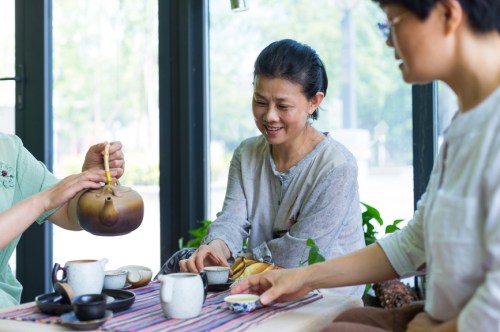Our editors independently select these products. Making a purchase through our links may earn Well+Good a commission
Of all of the venerable ingredients available to us, it is unquestionable to suggest that the tea leaf is one of the greatest. First cultivated thousands of years ago in China, the humble tea leaf is now found in nearly all cultures and cuisines; in fact, after water, tea is the most commonly consumed beverage in the world. And for folks who live in the Blue Zones, tea plays a particularly large role.
Experts in This Article
registered dietitian and nutritionist
registered dietitian and nationally-recognized food, nutrition, and wellness expert with a private nutrition counseling practice
The term Blue Zones, coined by longevity expert, journalist, and author of The Blue Zones Kitchen, Dan Buettner, refers to the regions of the world where people live the longest. The five regions are Okinawa, Japan; Sardinia, Italy; Nicoya, Costa Rica; Ikaria, Greece; and Loma Linda, California. Those who live in these parts of the planet share a few common lifestyle characteristics that appear to aid in their longevity. For example, explains Samantha Cassetty, RDN, “People in the Blue Zones also walk and move consistently during the day rather than spending an hour at the gym and then sitting the rest of the day at work, in a car, and on a couch.” Additionally, citizens of the Blue Zones tend to maintain routines to help them manage stress, a sense of community, and strong family ties.
Eating habits are also a key commonality, Cassetty says. “Blue Zone denizens eat a predominantly plant-based diet, and they eat until they’re content rather than full or stuffed. They also tend to eat less as the day goes on,” she explains. Surprisingly, regular (though moderate) consumption of alcohol is part of that diet, and so is a reliance on fresh fruits and vegetables, beans, nuts, whole grains, and other antioxidant-rich foods. Enter tea.
How L-theanine benefits cognitive function and longevity
“Tea is a very common drink in all of the Blue Zones,” Cassetty says. “Tea that stems from the Camellia sinensis plant is high in antioxidants, which proactively guard your cells from free radical damage and oxidative stress—both of which are processes that underlie the progression of many diseases. Based on what we know about tea drinkers and the protective compounds in tea, it’s likely that it plays a role in the healthfulness and long lifespans seen in these areas.”
There is one type of antioxidant known as L-theanine found in black and green tea leaves that makes these types particularly beneficial for health. “L-theanine is an amino acid that may affect certain chemicals in the brain, such as serotonin and dopamine,” explains Keri Gans, RDN. “It may produce a calming effect in our body, as well as improved alertness.” Moreover, research suggests that L-theanine found in green tea may have neuroprotective properties and possibly decrease your risk for dementia.
The only food source of L-theanine? Tea. That’s it.
“L-theanine benefits are bountiful,” agrees Cassetty. “It has been shown to help improve working memory, attention, and executive function, which impacts the ability to organize information and follow through with tasks. On top of these benefits, L-theanine can potentially reduce the risk of neurodegenerative diseases, such as Alzheimer’s disease.” And while you could try to take L-theanine supplements, Cassetty notes that this may actually be less effective than drinking tea. “Researchers concluded that green tea had a more significant influence on brain health than either L-theanine or caffeine alone,” she explains.
There are additional L-theanine benefits beyond brain function. For one, the compound has been found to lower the stress hormone cortisol. “This hormone can be useful when you’re in fight-or-flight situations, but it’s also released during daily stressors, like juggling parenting pressures and a demanding job,” Cassetty says. “Over time, high stress and cortisol levels can raise the risk of sleep problems, mood disorders, heart disease, and more. So, limiting stress can have a positive effect on your health.”
While the L-theanine found in green and black tea makes it an especially attractive varietal, studies have also shown that all types of tea—including herbal varietals like chamomile, mint tea, and rooibos—are good for the body and support healthy aging. In fact, a long-term study found that regular tea consumption was correlated with longer, healthier lives, in part because tea drinkers were less likely to develop heart disease and stroke.
Of course, when it comes to maintaining a healthy lifestyle, L-theanine and tea do not have to be your only saviors. “There are a number of tools you can use to modify stress. For example, take a work break outside, go for a walk, or participate in meditation or deep breathing exercises,” Cassetty says. If living longer isn’t a solid excuse to step away from your laptop, what is?
Oh hi! You look like someone who loves free workouts, discounts for cutting-edge wellness brands, and exclusive Well+Good content. Sign up for Well+, our online community of wellness insiders, and unlock your rewards instantly.
Sign Up for Our Daily Newsletter
Get all the latest in wellness, trends, food, fitness, beauty, and more delivered right to your inbox.
Got it, you've been added to our email list.











